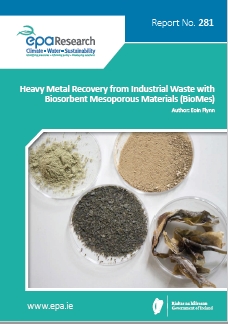Research 281: Heavy Metal Recovery from Industrial Waste with Biosorbent Mesoporous Materials (BioMes)
Authors: Eoin Flynn
Summary: This project presents a method to cheaply produce high-capacity biosorbents from Irish brown seaweeds.

Identifying Pressures
Heavy metals are highly toxic pollutants that bioaccumulate and persist in the environment. Uptake of heavy metals by plants and subsequent accumulation in the food chain can threaten animal and human health. Heavy metals can damage fish in aquatic systems and contaminate groundwater. They are difficult to remove from industrial waste water treatment systems. However, they are a highly valuable resource and are critical to most modern and future electronics technologies.
Over 500 species of seaweed have been identified from Irish waters, a great diversity of species from a small island. Scientists classify seaweeds (algae) based on pigments, with most marine macro-algae being green, brown or red. Seaweeds have been found to have a natural ability to remove heavy metals from water. The (BioMes) materials developed in this project were made from Irish brown seaweeds and can be used to effectively remove heavy metals from waste water.
BioMes materials can be produced sustainably, at low cost, and without using toxic compounds, unlike historical attempts to produce similar materials. Furthermore, they provide a potential means to capture economically valuable heavy metal resources.
Informing Policy
The current intensive use of the world’s natural resources is unsustainable. Optimising resource efficiency is critical in the long term to alleviate negative anthropogenic effects on the environment. In addition, these efforts will be key to securing economic growth and jobs for the future.
The Resource-Efficient Europe Initiative is a cornerstone of the Europe 2020 strategy for more effective use of resources and a low-carbon economy. This initiative has been incorporated into Irish governmental strategies. Related to this, in 2014 the European Commission formally identified a list of “critical” raw materials (i.e. materials with a high supply risk and of high economic importance), with heavy metals featuring prominently.
BioMes is a technology that can be used to recover precious resources from waste water in Ireland, using materials made from Irish seaweeds, thereby reducing the pollution that these precious but toxic metals can cause.
The Irish government is aware of the importance of developing the marine economy and of making better use of resources that are available in the Irish sea, such as macro-algae. BioMes technology represents a means of achieving this.
Developing Solutions
Heavy metals and certain non-heavy metals are highly problematic industrial pollutants in Ireland. Lead, zinc and copper are of concern in the environment and can cause contamination in groundwater and other natural water sources.
Heavy metals can bind to natural polymers (polysaccharides) within brown seaweeds, which presents an opportunity to develop materials that can be used for effective environmental remediation and removal of pollutants from waste water.
https://www.epa.ie/media/epa-2020/publications/research/Research_281_thumbnail[1].jpg